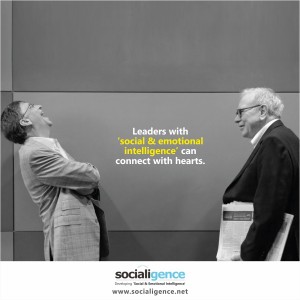
Beyond a level, leadership is not only about “what you know” but also about “who you know”.When you hear successful people saying that ‘it’s a small world’, actually it is the radius of their circle that is increasing.Yes! Leaders need to continuously expand their orbits of influence – by making long-term meaningful associations that are based on mutuality.
Such associations are as much driven by personal rapport as by professional repute. Leaders like to bond with those leaders who are not only competent and reputable but are also personable, genuine, interesting and collaborative. In other words, you can only develop real ‘connections’ with other leaders in the fraternity when you are seen as someone who is:
- a feel-good presence
- a sounding board for ideas
- a trusted confidant
- a person who feels anemotional stake in other person’s success
But how to develop such qualities? Well! To develop these qualities, the fundamental-requisites are:
- Self-awareness
- Empathy
- Emotional resonance
- Interpersonal responsiveness
These fundamental-requisites are not derivatives of only one’s genes, upbringing or experiences. They can be cultivated through conscious choices, small mental-habits, progressive behavioral-change, and practicing it all diligently until it becomes a part of skill-set.
That’s where ‘Social & Emotional Intelligence’ comes into play. We, at Socialigence, define Social & Emotional Intelligence as the “Ability to adapt one’s behavior on the basis of awareness of one’s own emotions and attunement with others’ emotions”.

As one of the Top-10 Future Work Skills according to The Institute for the Future (IFTF), it isessential skill for leadersacross all the industries and functional areas. It is at the base of all interpersonal skills and adds to one’s repertoire the readily applicable sub-skills like ‘spotting emotions through observing nonverbal behavior (body language)’.
It makes you a more ‘resonant and responsive’ person, and helps you in developing genuine connections in the fraternity, which eventually become the cornerstones for growth of the department and organization that you are leading.
After all, all of us like to feel respected, valued and cherished; and profession is a small world where personal equations are an integral part of professional associations. That’s why people like to work with people they like and trust. And at the base of it is the all-important skill of leadership – Social & Emotional Intelligence.
Dr. Sandeep Atre (Founder-Director, Socialigence)
